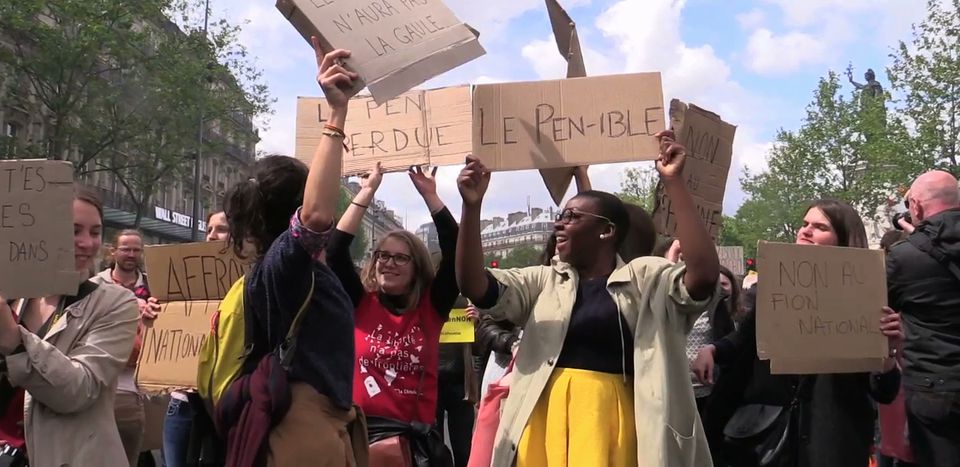
Has France had enough of the Front National?
Published on
Translation by:
Phil W. BaylesMarine Le Pen and Emmanuel Macron will go head-to-head in the polls this weekend. Faced with the prospect of the far-right Front National taking power, unions have sprung into action to block her. But unlike in 2002, when France mobilised against Le Pen's father, Monday's demonstration drew much smaller crowds.
Parades, rallies and demonstrations: this year's May Day marches were a reflection of the divisions in France during this election season. At the rue Rivoli, Jean-Marie Le Pen paid fiery homage to Joan of Arc. While the former FN leader reaffirmed his support for his daughter, three major French unions called on supporters to vote for her opponent, Emmanuel Macron, in a march symbolically reminiscent of May 1, 2002; when the French people overwhelmingly backed Jacques Chirac when faced with the threat of Le Pen Senior. Now, that threat has resurfaced: Marine Le Pen has made it to the second round of elections, just three points behind the leader of En Marche!. However, this week's marches were a pale imitation of the rallies in 2002. What's changed in 15 years?
Dédiabolisation de façade
The success of the Front National in 2017 is not the political coup de tonnerre that it once was. In fact, Le Pen has long been a part of the French political landscape. The FN's image has been slowly sanitised with every election. For Mathieu Molard, the editor-in-chief of Streetpress and a journalist who specialises in covering the Front National, there are lots of different factors at play: chief among them, a political disenchantment among a French electorate faced with "a lack of fit examples among the personalities in the run-up to the first round of voting." There's also the issue of polls, which seemed to paint Le Pen's victory as "inevitable" when it was announced she had made it to the second round.
But this "banalisation" of the FN can only be explained in context. It's been the FN's long-term plan for years, and one that many thought would be impossible. The plan, led by Marine Le Pen's number 2, Florian Philippot, consists of removing certain radical elements of the party in order to give it a wider appeal. "That's not to say the party has really deradicalised itself," says Molard, pointing to the swift ascension through the party ranks of some former members of Groupe Union Défense (an extreme right-wing student organisation known for its violent protests), who are now part of Le Pen's inner circle. "The FN wanted to make itself look less scary for voters," says Marwan, a 22-year-old protestor. "That's how they've been able to get a bigger share of the vote today."
"A racist, xenophoic, anti-feminist, anti-liberal party"
The unions wanted to nip that trend in the bud. Under the marble statue of Marianne (the symbol of France, they sent out the call for protesters. Those who answered set forth on the narrow Avenue de la République, the chants from their sound systems making a deafening racket.
"We have to fight the FN for the sake of progress," says Philippe Martinez, secretary general of the General Confederation of Labour (CGT). "The FN is a racist, xenophobic, anti-feminist and anti-liberal party." However, the Worker's Force (FO) weren't given similar instructions; which is emblematic of the paradox at the heart of these protests. Here and there are references to Donald Trump and to Brexit, less-than-flattering comparisons between the FN's former leader and other European populists. But these shouts are drowned out by the mixed messages of the groups present. The Union of European Federalists marches side-by-side with a group marching in opposition to the state of Israel. Communist flags and effigies of Mao and Stalin are visible everywhere. In their tight rows, led by a minibus, they seem to be marching in an entirely different protest. The FN's opposition is so scattered that they seem to have lost the primary point of the demonstration itself.
The march drags itself on. Close to Bastille, it suddenly lurches to a halt. We check our social media feeds and read the news: balaclava-clad activists from the Black Bloc - radical, anti-fascisct anarchists - have hijacked the march. According to Interior Minister Matthias Fekl, "6 police officers have been injured, including one with a badly injured hand and another with serious facial burns." It's a stark contrast with the genial ambience of the rest of the protests. Yet it's enough to bring a bitter aftertaste to proceedings.
Has the movement against the FN been successful. We'll find out on Sunday night.
Translated from La France emmerde-t-elle le Front National ?



